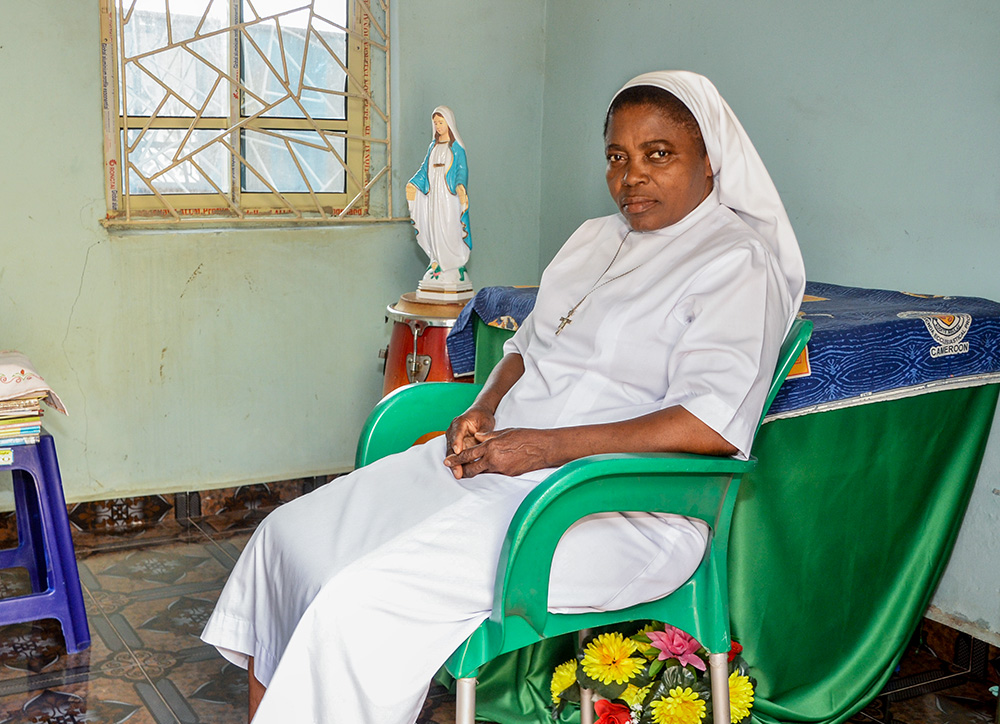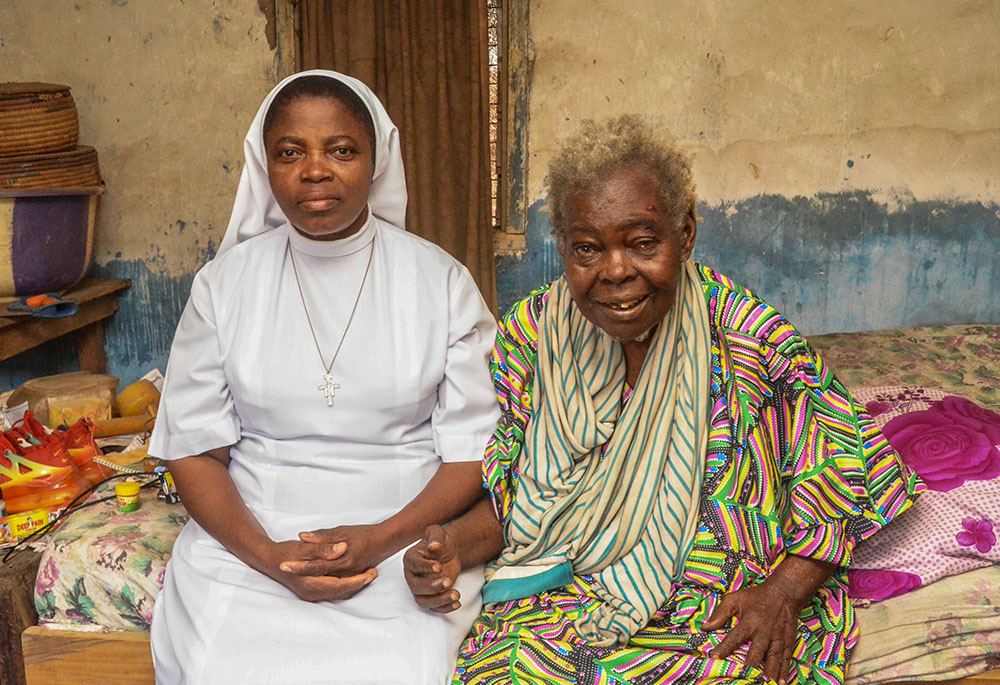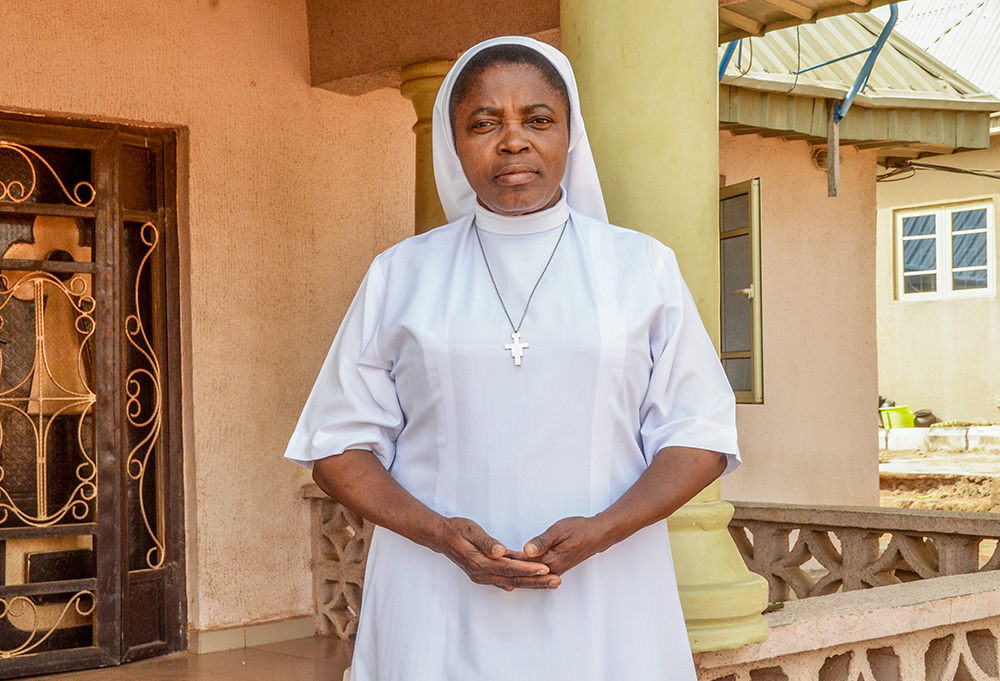
Sr. Cordelia Anekwem sits in the chapel of the Tertiary Sisters of St. Francis in Gboko, Nigeria, Jan. 31. (GSR photo/Valentine Benjamin)
Sr. Cordelia Anikwem, a nun of the Tertiary Sisters of St. Francis in Gboko, a town in Benue State, Nigeria's Central North, never had an interest in caring for the elderly before becoming a nun. She was born into the family of the late Chief Aniebo Anikwem in Ezeagu Local Government Area, in Enugu State, Southeastern Nigeria. She's the second child and first daughter in a family of seven.
She was a member of the Legion of Mary in Enugu, where she and her members carried out corporal works of mercy. Speaking to Global Sisters Report, Anikwem explained that her passion for the elderly grew as a member of the Legion of Mary, even before joining the Tertiary Sisters of St. Francis in 2006.
"We did hospital visitations to pray for the sick, and we also visited other places that needed charitable assistance, like the Achara layout Awkunanaw elderly care home in Enugu, an apostolate which I grew up with."
Her ministry in Gboko focuses on providing sustainable long-term care for elderly citizens. The town has had a dramatic increase in life expectancy, which poses a variety of new challenges for families and communities. A growing elderly population requires unique care that may not be readily available.
The problem stems from the fact that the responsibility of elder care has fallen to the family unit. There are fewer care providers in the home to provide for aging family members. Many of the elderly are abandoned and locked inside the house, while some are homebound as a result of sickness and disability and are neglected. Some of them are blind.

On Jan. 31, Sr. Cordelia Anekwem of the Tertiary Sisters of St. Francis sits with Elizabeth Miami, an elderly woman left alone by her family in Gboko, Nigeria. (GSR photo/Valentine Benjamin)
Since July 2022, when she started, Anikwem has provided care for more than 50 beneficiaries within the town of Gboko. She says her work goes beyond providing support such as food, clothing, detergent and other necessities like health care to the senior members of the communities.
"We equally intend to organize a get-together once in a while to distribute some items like food, bathing necessities, clothing and medicine, as their need may arise. This will help them be in contact with each other and share their experiences. We are also making plans to organize a mobile clinic, where they can consult with medical doctors to ascertain their health condition, with medication prescribed and administered if we get the financial support we need," Anikwem told GSR.
_____
GSR: Nigeria is a culturally and environmentally diverse country where family values are based on love and empathy. What are some of the health challenges you have noticed in some of the elderly population, especially those who feel abandoned, abused or neglected by loved ones?
Anikwem: Some health challenges I have noticed in the elderly population stem from a lack of regular medical care. In cases like hypertension, stroke, diabetes, cancer and prostate cancer in men, lack of a balanced diet and poor nutrition are most likely the culprits.
In terms of psychology, some of them are depressed, and some are dealing with anxiety disorder. Some of them even [experience] sexual abuse and violence. Many of them are withdrawn and suffer in isolation as a result of their experiences.
What are the social priorities and complex needs of the aging population you have noticed since you started working in July 2022, and how have you provided adequate health care, education and support services to them?
I'll start with their medical needs. Some of them have eye problems. Some are completely blind. Some have swollen, sore feet and need physical therapy. Some also need medical care and nutritional support.
Advertisement
So, for those with these medical conditions, we provide medical personnel like nurses and counselors who counsel them.
Apart from all these health needs, I go there from time to time to stay with them, talk with them, associate with them, keep them company and support them with the provision of food, clothes and anything I can lay hands on, like medical care. I also help them clean their environment and sometimes cook for them.
In Nigeria, access to health care is extremely limited by fragile health care infrastructure, limited manpower and out-of-pocket payment arrangements that are mostly caused by the absence of health care insurance. How do these gaps impact care for the elderly?
The fragile health care infrastructure and limited health care workers here in Gboko are at the extreme. There are a few hospitals around, and they lack personnel.
Not only that, the elderly cannot afford medical services when they need them. On top of that, there is a lack of health insurance, and their health continues to deteriorate.
Their sickness remains uncured, and most of them die. Health specialists are scarce, and most hospitals are far away.
For instance, last week, we visited a woman who complained of heart problems. She suffered from cardiovascular disease, and there's no heart specialist around here in Gboko. She died eventually; it was painful that she died this way.

Sr. Cordelia Anekwem of the Tertiary Sisters of St. Francis poses in front of her convent in Gboko, Nigeria, Jan. 31. (GSR photo/Valentine Benjamin)
This aging population requires specialized care. Family members who provide long-term care lack the resources to give better care and are faced with the choice of neglecting their dependent older relatives. How are you able to fill these needs?
Caring for aging people needs long-term patience, especially when providing them with food, wash kits and treatment associated with old age. Most of them are community-bound. So, I move from house to house and provide the required support and all they need.
Your program has benefited over 50 people within the community where you work. Is this more of a social work than ministry to you?
Both cannot be separated because when it is social, it is also ministry. They are interwoven in that you encounter spiritual, physical, health and social needs in doing this work.
So, as we come in with this intervention, anything we witness on the ground is not left undone.
What is the greatest lesson that your work and Catholic faith has taught you?
The greatest lesson my work and the Catholic faith have taught me is that care for human life is supposed to be the most important thing on earth, and it should not be neglected or abandoned, no matter the age of the person.
It has also taught me the need to defend the dignity and rights of the elderly and to promote the general welfare of human life.







